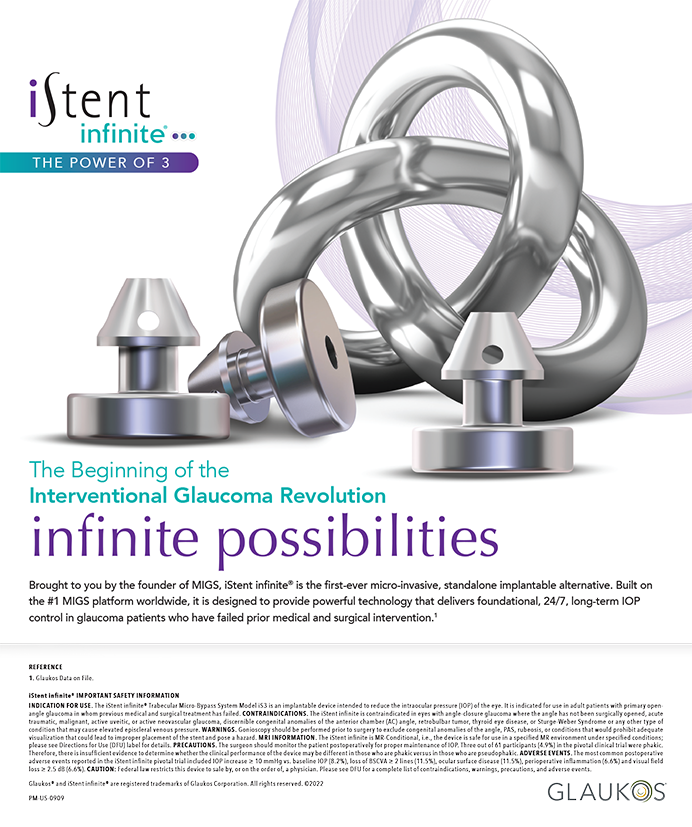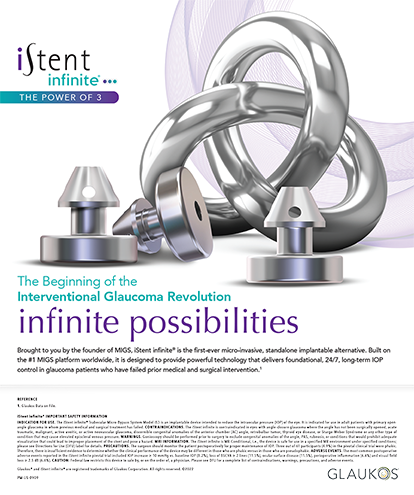Laurence A. Parks Daloz points out, “What we model for our students is not our knowledge but our curiosity, the journey, not the destination.”1 This sentiment is worth considering in the context of the great privilege ophthalmologists have of treating patients while training the next generation of eye surgeons. Among the highest honors are guiding the lives and careers of trainees, anticipating the restoration of sight in their future patients, and positively shaping the ophthalmic profession as mentors and conduits of both knowledge and core values.
MENTORING: AN INVESTMENT IN THE INDIVIDUAL AND THE FUTURE OF OUR PROFESSION
The greatest threat to the future of ophthalmology is not the economy, litigation, organized optometry, managed care, or even the political decision makers in Washington. Rather, it is the progressive marginalization and deprioritization of departments of ophthalmology. By reducing material support and de-emphasizing ophthalmic research and teaching, academic medical centers make it more difficult to attract, support, and sustain the best and the brightest on faculties in the university-based academic programs that are largely responsible for training the next generation of specialists. Educational paradigms may shift. The training environment created during residency, and in many cases fellowship, however, remains the primary means of developing how the next generation of ophthalmologists approaches patients’ care and these physicians’ attendant surgical skill sets. It is during training that they establish a foundation and develop their personal patterns for future learning.
The important function of a mentor goes beyond that of role model and teacher. He or she is invested in the future success of the trainee. Fellowship training is particularly appealing, because there is often an opportunity for fellows to interact with mentors and exchange ideas. Ideally, however, this should be established as a primary objective during residency, because not every resident pursues fellowship training.
BEYOND THE TECHNICAL ASPECTS OF SURGERY
The technical aspects of surgery are essential to an ophthalmologist’s training. Also essential is learning how to recognize and manage complications and unexpected outcomes as well as how to communicate with patients and their families. Of greater necessity, however, is the judgment required in surgical decision making to accomplish the best for each patient. Ophthalmologists must learn how to prepare patients for surgery, manage their expectations, and deliver care with empathy and sincerity, all while showing the human side of medicine. Trainees should be exposed to these elements as part of an active learning process. They must learn what to do and what not to do, when to operate and when to provide healing without surgical intervention. Healing is a complex process, and for an individual patient, it can occur absent a cure or even a treatment for a specific disease.
TAILORING THE MENTORING PROCESS
Surgical mentoring involves carefully and gradually taking trainees outside their comfort zones so that they may experience the learning curve for a new or complex procedure. Permitting this growth while ensuring patients’ safety and quality outcomes requires mentors to perform a meticulous assessment of each trainee’s skill set.
Having mentored young surgeons for more than 20 years (Figure 1), I can rapidly spot those who have hands with innate dexterity or skills likely developed at a relatively young age (usually from playing a musical instrument or from using certain toys or tools). It is easier to build upon good techniques and habits that respect instrumentation and tissue than to break bad habits developed under inadequate supervision or poor teaching. Although almost everyone in residency is capable of dramatically improving his or her surgical skills, I remember one resident early in my career who was about to sign a contract that promised high-volume surgery. I believed this person was poorly suited to this type of environment, so we had a heart-to-heart talk. My advice went unheeded. Ten years and four very unhappy jobs later, this person gave up surgery completely, but we remain dear friends. Although this resident met the criteria for graduation and would have been an acceptable surgeon at much lower volumes, I recognized that no amount of training was going to prepare this individual to succeed in the typical modern practice and surgical setting.
THE TRAJECTORY OF CHANGE
Because the surgical setting is often highly pressured, it is important for the mentor to be aware of and sensitive to obstacles that could disrupt his or her relationship with the surgeon in training. For example, residencies for the most part are still 3 years in duration, yet the material that must be mastered as “fundamental” has grown substantially during the past few decades. Restricting residents’ working hours has had some negative repercussions with respect to the continuity of patients’ care and exposure to unusual circumstances. When asked if there were problems associated with being on call every other night, thoracic surgeons at the Duke University Medical Center, where I teach, used to jokingly respond, “Yes, you miss half the cases.” Patients’ safety is, of course, paramount, so a rested surgeon is an asset. In reality, however, mentors now have less time to teach more material, likely a contributing factor to the trend of more residents pursuing fellowship training.
Ophthalmic culture is also changing with respect to joint commission requirements, HIPPA, wrong-site surgery prevention, and interactions between nurses, technicians, and physicians. There is a growing need to manage distraction during surgery, potentially a greater problem for the novice surgeon. The young surgeon needs to be trained to function optimally under both internal and external regulatory pressures. Teaching styles and methods of interaction must also respect growing cultural diversity within the mentoring relationship.
THE INTERNET AND PATIENT-PHYSICIAN INTERACTION
Many patients (and their family members) are Internet savvy and much more educated about their surgery than in the past. They have higher expectations regarding their outcomes and the actual surgical experience. Under topical anesthesia with minimal sedation, patients are aware of the conversations and activities that go on during surgery, and in general, they are less willing today to be a “teaching case.” Patients’ expectations combined with concerns regarding professional reputation, time management, and even the threat of litigation can cause senior surgeons to conclude it is much easier to “just do it myself.” For these reasons, most choose a career path that does not include mentoring surgical trainees. More unfortunate than losing talented teachers are the unhealthy mentoring relationships that can develop when a person signs on to staff resident surgery purely to promote or market this activity to potential patients in his or her outside practice, while the consistency and quality of actual instruction are sorely lacking.
The saying that those who can’t do, teach is a fallacy in ophthalmic training. I have found few things that stretch and grow a surgeon’s skill set more than teaching a young surgeon. Any ophthalmologist who reflects on his or her own training and career and recognizes that he or she has been molded by great teachers is more likely to want to give back by teaching the next generation. People who do not like to teach may feel differently after overcoming the fear they may have of exposing their own limitations.
WHAT THE PATIENT HEARS
The importance of learning to communicate with patients with clarity, precision, and economy of message is underrated. Trainees repeatedly tell me that they appreciate the time I spend coaching them on perspicuity. A critical aspect of communication is being able to hear one’s words through the ears of the patient before saying them and quickly modifying both the content and delivery of the message for optimal communication. For example, during surgery, “Mrs. Smith, I am going to insert this speculum into your eye” becomes “Let me help you keep your eye wide open.” Whenever possible, I avoid pejorative words or a tone that might create hostility or anxiety in the OR. I teach trainees to accurately report problems and document complications while using a vocabulary in the OR that does not further traumatize or raise the anxiety level of the patient.
A form of “vocal local” cultivates cooperative patients with minimal sedation. Humor is a wonderful part of everyday interaction but can backfire in the OR if interpreted as sarcastic or disparaging. These subjects as well as topics of conversation, selected music, OR etiquette, and other aspects of interaction are all relevant for surgeons in training. They must learn that changes to the OR setting are seldom isolated and may have unintended consequences. I use a Rubik’s Cube to illustrate one’s inability to make a change that affects only a single side.
MAINTAINING PERSPECTIVE
On occasion, trainees early in their careers express frustration when watching several different surgeons perform the same procedure in entirely different manners. These young surgeons find it difficult to synthesize in their own minds what might be the best technique or combination of techniques to adopt. To me, this is a golden opportunity to work with trainees to distill the key underlying surgical principles so that they come to understand the procedure as a professional, rather than as a tradesman. It is important for them to recognize the fundamental aspects of surgery and to appreciate that each successful operation is built by a series of successful steps. Although surgeons may initiate a capsulorhexis differently, the achieved result is fundamentally the same.
A LIFETIME OF LEARNING
This article skims the surface of a topic that deserves much greater attention. A healthy and highly interactive relationship between a mentor and a surgeon in training will be remembered by both as rewarding and highly enjoyable. A failed relationship is a missed opportunity that will leave the trainee frustrated and feeling that he or she got little in return for his or her investment of time and effort. I have tried to review a few of the characteristics that lead to a positive exchange and a healthy mentoring relationship. I continue to work toward improving my own skill sets as a mentor, while also benefiting as the recipient of ongoing, active mentoring.
Alan N. Carlson, MD, is a professor of ophthalmology and chief of corneal and refractive surgery at the Duke Eye Center in Durham, North Carolina. Dr. Carlson may be reached at (919) 684-5769; alan.carlson@duke.edu.
- Rombeau J,Goldberg A,Loveland-Jones C.Surgical Mentoring: Building Tomorrow’s Leaders.New York NY:Springer;2010:42.


